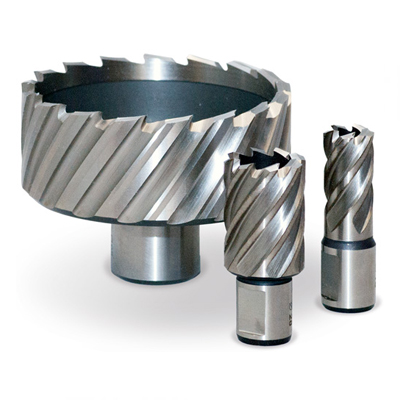Product Knowledge – Annular Cutters
What are the cutters called that is used by a magnetic base core drill?
The cutters used by a magnetic base core drill are typically called “core bits” or “core cutters.” These cutters have a hollow cylindrical shape and are designed to cut a core or hole out of a material, such as metal or concrete. They are usually made of high-speed steel or carbide, and are available in a range of sizes to accommodate different drilling needs. The magnetic base core drill uses the magnetic base to attach the core bit securely to the material being drilled, allowing for precise and efficient drilling.
What is an annular hole cutter?
An annular hole cutter, also known as an annular cutter or core drill bit, is a specialized cutting tool used to create annular holes or annular slots in metal or other hard materials. The cutter consists of a hollow cylindrical body with teeth or cutting edges around the outer edge. When the cutter is rotated, the teeth cut into the material, creating a round hole with a clean edge and removing a core or annulus of material.
Annular cutters are typically used in applications where a high-quality hole is required, such as in metal fabrication, construction, and maintenance. They can create holes of various sizes and depths, and are capable of cutting through thicker materials than traditional twist drills. Annular cutters are often used in magnetic base drills or other specialized drilling machines, and are available in a range of sizes and materials, including high-speed steel, cobalt, and carbide. They are a popular alternative to twist drills, as they offer faster cutting, better hole quality, and longer tool life.
What machines use hollow core bits?
Hollow core bits, also known as core cutters, are typically used in drilling machines that are designed for cutting precise holes in hard materials such as metal, concrete, and stone. Some examples of machines that use hollow core bits include:
- Magnetic base core drills: These are handheld machines that use a magnetic base to attach the drill to the material being drilled. They are commonly used in construction, metalworking, and other industries where precise, high-speed drilling is required.
- Diamond core drills: These machines use diamond-tipped hollow core bits to drill through materials such as reinforced concrete, asphalt, and stone. They are commonly used in construction and geological exploration.
- Rotary hammer drills: These are heavy-duty drills that use hollow core bits to drill through hard materials such as concrete and masonry. They are commonly used in construction and demolition work.
- Horizontal directional drilling machines: These are large machines that use hollow core bits to drill underground for the installation of utility lines and pipelines. They are commonly used in the construction and energy industries.
What is a Magnetic Base Core Drill?
A magnetic base core drill, also known as a mag drill or magnetic drill, is a portable drilling machine that uses an electromagnetic base to attach the drill to the material being drilled. The drill consists of a motor, a spindle, and a hollow core cutter or bit that is used to cut precise holes in metal, concrete, and other hard materials.
The magnetic base of the drill consists of a powerful magnet that can be turned on and off using a switch, allowing the drill to be securely attached to the material being drilled. The magnet is designed to provide a stable base for the drill, which is important for maintaining accuracy and reducing vibration during drilling.
Mag drills are commonly used in construction, metalworking, and other industries where precise, high-speed drilling is required. They are favored for their portability and versatility, as they can be easily moved from one job site to another and used for a variety of applications. They are available in a range of sizes and configurations, with different motor and spindle options to suit different drilling needs.

Comments
Add comment